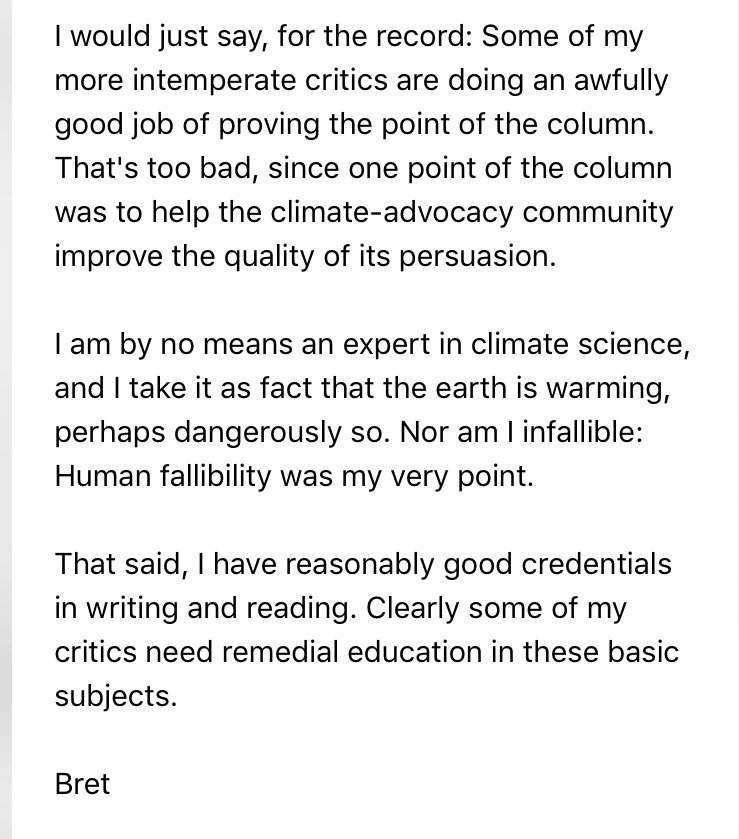NYT Columnist Stephens Says There Are Still Questions About Global Warming Predictions. The Left Loses Its Mind. Here's Why They're Full Of It.
On Saturday, brand new New York Times conservative columnist Bret Stephens
penned a moderate column about climate change. In that column, he says that
global warming due to man-made activity is a certainty:
Anyone who has read the 2014 report of the Intergovernmental
Panel on Climate Change knows that, while the modest
(0.85 degrees Celsius, or about 1.5 degrees Fahrenheit) warming
of the Northern Hemisphere since 1880 is indisputable, as is the
human influence on that warming, much else that passes as accepted fact is really a matter of probabilities. That’s especially true of the sophisticated but fallible models and simulations by which scientists attempt to peer into the climate future. To say this isn’t to deny science. It’s to acknowledge it honestly.
Stephens cautions against false certainty – failing to report uncertainty in data.
“We live in a world in which data convey authority,” Stephens says. “But authority
has a way of descending to certitude, and certitude begets hubris.” Stephens’
language about certainty is actually designed to help climate change enthusiasts –
if they keep making claims that keep being proved wrong, without any doubts
baked into the cake, people will simply discount what they’re saying.
has a way of descending to certitude, and certitude begets hubris.” Stephens’
language about certainty is actually designed to help climate change enthusiasts –
if they keep making claims that keep being proved wrong, without any doubts
baked into the cake, people will simply discount what they’re saying.
This moderate take has led a mass revolt by leftists who insist they will now
cancel The New York Times. They call Stephens’ column denialism, even
though Stephens acknowledges global warming has taken place. They say
that it’s just wrong on a factual level. Susan Matthews of Slate called the
piece “classic climate change denialism,” explaining that reasonable people
could not be “skeptical about the dangers of climate change.” Erik Wemple
of The Washington Post actually wrote an email to the paper complaining
about the op-ed and asking for answers on Stephens’ piece – something he
hasn’t done on any other New York Times op-ed he’s ever reported.
cancel The New York Times. They call Stephens’ column denialism, even
though Stephens acknowledges global warming has taken place. They say
that it’s just wrong on a factual level. Susan Matthews of Slate called the
piece “classic climate change denialism,” explaining that reasonable people
could not be “skeptical about the dangers of climate change.” Erik Wemple
of The Washington Post actually wrote an email to the paper complaining
about the op-ed and asking for answers on Stephens’ piece – something he
hasn’t done on any other New York Times op-ed he’s ever reported.
Here was Stephens’ eminently correct response:
Nonetheless, Nate Silver of FiveThirtyEight complained:
I’ve read Silver’s book, The Signal and The Noise. It’s an excellent primer on
data analysis. He has an entire chapter on climate change. In that chapter, he
states, “In climate science, this healthy skepticism is generally directed as the
reliability of computer models used to forecast the climate’s course” – in other
words, precisely the sort of data Stephens seems to be questioning in this piece.
Silver continues, “A survey of climate scientists conducted in 2008 found that
almost all (94 percent) were agreed that climate change is occurring now, and
84 percent were persuaded that it was the result of human activity. But there
was much less agreement about the accuracy of climate computer models.” In
fact, here is Silver’s conclusion: “When we advance more confident claims and
they fail to come to fruition, this constitutes much more powerful evidence
against our hypothesis….[Science] is a work in progress, always subject to
further refinement and testing. This is what scientific skepticism is all about.”
data analysis. He has an entire chapter on climate change. In that chapter, he
states, “In climate science, this healthy skepticism is generally directed as the
reliability of computer models used to forecast the climate’s course” – in other
words, precisely the sort of data Stephens seems to be questioning in this piece.
Silver continues, “A survey of climate scientists conducted in 2008 found that
almost all (94 percent) were agreed that climate change is occurring now, and
84 percent were persuaded that it was the result of human activity. But there
was much less agreement about the accuracy of climate computer models.” In
fact, here is Silver’s conclusion: “When we advance more confident claims and
they fail to come to fruition, this constitutes much more powerful evidence
against our hypothesis….[Science] is a work in progress, always subject to
further refinement and testing. This is what scientific skepticism is all about.”
Which is exactly Stephens’ point.
But because Stephens is a conservative, when he says that he wants climate
change advocates to be more exact in their phraseology without overstating
levels of certainty, that’s a cause for outrage. You can only express scientific
skepticism if you express no scientific skepticism, apparently.
change advocates to be more exact in their phraseology without overstating
levels of certainty, that’s a cause for outrage. You can only express scientific
skepticism if you express no scientific skepticism, apparently.




No comments:
Post a Comment
Thanks for commenting. Your comments are needed for helping to improve the discussion.